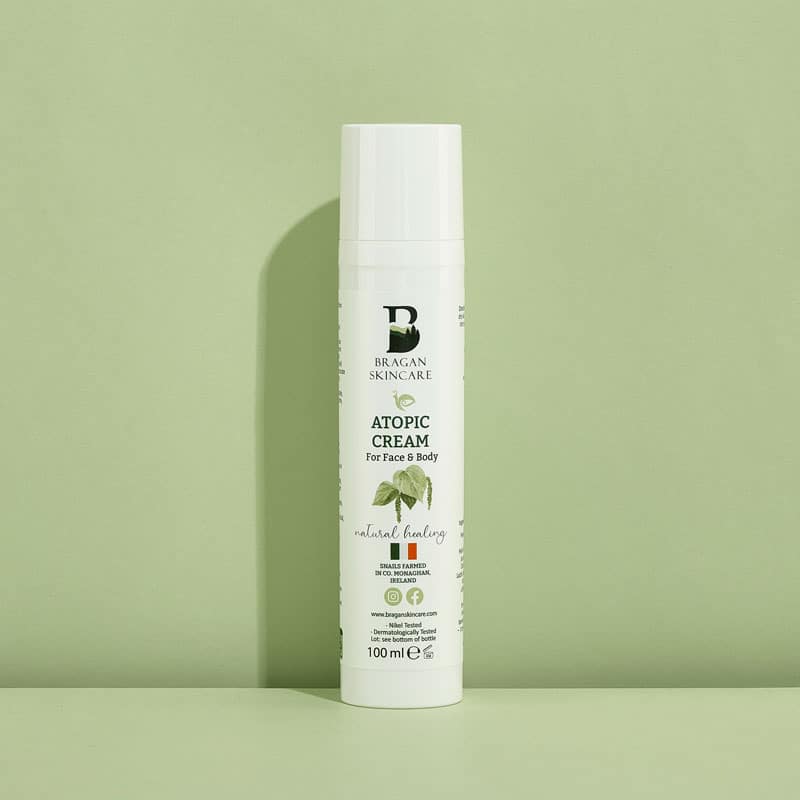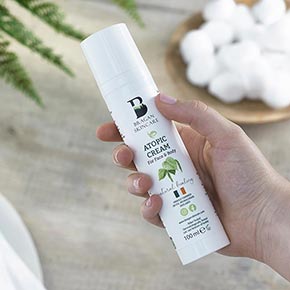Penile Seborrheic Dermatitis Is Not an STD: Symptoms & Treatment
Fast answer:
Penile Seborrhoeic dermatitis (also spelled seborrheic dermatitis) is a non-contagious inflammatory skin condition that can cause redness, mild burning, flaking, or irritation on the genital skin. It is not an STI. Symptoms often improve with gentle cleansing, avoiding irritants, and using a fragrance-free barrier-supporting moisturiser. If symptoms are painful, weeping, spreading, or you’re unsure, see a GP to rule out infection.
Many people search for a penile rash or redness worrying about infection, but seborrhoeic dermatitis is a common non-STI cause.
Penile seborrheic dermatitis is more common than many people think. Yet, because it affects such a sensitive area, it can feel worrying or embarrassing. However, here is the good news: penile seborrheic dermatitis is manageable, treatable, and not dangerous.
With the right care and consistent habits, most people see real improvement. In this guide, you will learn what penile seborrheic dermatitis is, what causes it, what symptoms to look for, and how you can treat and prevent flare-ups gently and confidently.
For the broader picture (scalp, face, eyebrows, triggers, and long-term routines), see our full Seborrhoeic Dermatitis Hub.
Table of Contents
- What Is Penile Seborrheic Dermatitis?
- Symptoms
- Causes
- Effective Treatments
- Daily Care Tips
- Natural Remedies
- Preventing Flare-Ups
- When to See a Doctor
- Common Myths
- Living Confidently With the Condition
- Conclusion
- FAQs

What Is Penile Seborrheic Dermatitis?
Penile seborrheic dermatitis is a type of dermatitis that develops on the skin of the penis. It often appears in areas where the skin produces more natural oil. Although it may cause redness, itching, or flaking, it is non-contagious, harmless, and unrelated to poor hygiene.
Typical Features
- Red or pink patches
- Mild scaling or flaking
- Occasional itching
- Increased sensitivity
This type of genital seborrheic dermatitis behaves similarly to seborrheic dermatitis on the scalp or face.
Symptoms of Penile Seborrheic Dermatitis
Symptoms can vary, but the most common ones include:
- Red or pink patches that may look shiny or slightly moist
- Light flaking or scaling
- Itchiness, which can worsen without treatment
- Tenderness or sensitivity
These symptoms of seborrheic dermatitis on penis skin can come and go. Many people experience flare-ups triggered by weather changes, stress, or irritants.
Is penile seborrhoeic dermatitis an STI?
No. Penile seborrhoeic dermatitis is not a sexually transmitted infection.
It is an inflammatory skin condition linked to oil production, skin barrier sensitivity, and yeast that naturally lives on the skin. It cannot be passed between partners through sexual contact.
This is important reassurance. Many people delay seeking help because they fear infection or stigma. Seborrhoeic dermatitis is closer to dandruff or facial seb derm than an STI.
That said, if symptoms include sores, discharge, pain when urinating, or sudden swelling, a GP or sexual health clinic should rule out infection. Skin conditions and infections can look similar, and a quick check provides peace of mind.
Can penile seborrhoeic dermatitis be mistaken for an STI?
Yes — and this is one of the main reasons people feel anxious. Several genital skin conditions can look similar at first. The key differences are in pattern, sensation, and progression.
| Condition | Typical appearance | Sensation | Key clue |
|---|---|---|---|
| Seborrhoeic dermatitis | Red patches, mild flaking, shiny skin | Mild burn or itch | Often linked to scalp/face seb derm |
| Thrush | Red moist rash, possible white coating | Itch + soreness | May involve partner symptoms |
| Contact eczema | Dry cracked irritated skin | Itch + sting | Triggered by products or friction |
| STI concerns | Sores, blisters, discharge | Pain or tenderness | Needs same-week medical check |
If you’re unsure, a GP or sexual health clinic can quickly rule out infection. Doctors see this every day — getting checked is normal and sensible.
Causes of Penile Seborrheic Dermatitis
Although the exact cause is not fully understood, several factors contribute to flare-ups of penile seborrheic dermatitis (a type of penile dermatitis).
What triggers flare-ups in the genital area
The genital area is warm, moist, and exposed to friction. That makes it especially vulnerable to irritation.
Common flare triggers include:
- sweating and tight clothing
- fragranced soaps or body washes
- condoms or lubricants with irritants
- stress and fatigue
- over-washing or harsh cleansing
- steroid creams used too frequently
- untreated scalp or facial seb derm
Managing triggers is often just as important as using treatment.

Effective Treatments for Penile Seborrheic Dermatitis
Managing this condition requires gentle, consistent care. Here are the best treatment options.
Best cream for seborrheic dermatitis
1. Gentle Cleansing
- Use a mild, fragrance-free cleanser
- Avoid harsh soaps or body washes
- Wash with lukewarm water
- Pat dry gently — avoid rubbing
2. Topical Treatments
The right topical product can calm irritation quickly.
- Bragan Skincare’s Atopic Cream
A gentle, fragrance-free moisturiser made with snail mucin. It helps reduce redness, itching, and irritation while supporting skin repair. - Hydrocortisone (mild steroid)
Can reduce inflammation. - Antifungal creams
Useful when yeast overgrowth is a major trigger. - Zinc oxide ointments
Protect the skin and calm irritated areas.
3. Moisturisers
Choose moisturisers that are:
- Fragrance-free
- Lightweight
- Hypoallergenic
- Safe for delicate skin
Lifestyle Changes That Calm Penile Seborrhoeic Dermatitis
Small habits can make a big difference:
- Reduce stress with breathing exercises, meditation, or gentle activity
- Stay hydrated throughout the day
- Avoid alcohol and caffeine, as they can dry the skin
- Maintain good hygiene, but avoid overwashing
Natural Remedies
Some natural ingredients can offer gentle support:
- Snail mucin — known for its soothing and repairing benefits
- Aloe vera — calms irritated skin
- Coconut oil — moisturises and nourishes
- Tea tree oil — antifungal properties (must be well diluted)
Always patch test first, especially on sensitive skin.
Preventing Flare-Ups
Consistency is key. You can reduce flare-ups with these steps:
- Stick to a gentle cleansing routine
- Moisturise daily
- Wear breathable cotton underwear
- Avoid tight clothing
- Reduce sugar and processed foods
- Exercise regularly
- Avoid scratching
Keeping the area dry is also important, as moisture can worsen yeast-related irritation.
Step-by-step routine: morning + evening
A simple routine protects the skin barrier and reduces inflammation.
Morning
- Rinse gently with lukewarm water (avoid strong soap)
- Pat dry — do not rub
- Apply a thin layer of fragrance-free moisturiser
- Wear loose, breathable underwear
Evening
- Wash gently if sweaty or active during the day
- Avoid hot water
- Reapply barrier-supporting moisturiser
- Let skin breathe before dressing
Consistency matters more than complexity. Gentle daily care is what stabilises sensitive genital skin.
When to see a GP (and what to ask for)
See a GP if:
- symptoms last longer than 2–3 weeks
- the rash spreads or becomes painful
- there is discharge, bleeding, or open sores
- treatment is not helping
- you are unsure whether infection is involved
You can ask:
“Could this be seborrhoeic dermatitis or another inflammatory skin condition?”
A GP may recommend antifungal creams, anti-inflammatory treatment, or referral to dermatology if needed.
Early reassurance prevents unnecessary anxiety.
Common Myths About Penile Seborrheic Dermatitis
Myth: It is caused by poor hygiene.
Fact: Overwashing can make it worse. The condition is linked to genetics, yeast, and inflammation.
Myth: It affects sexual health permanently.
Fact: It may cause temporary discomfort but has no long-term impact.
Myth: It is contagious.
Fact: It cannot be spread through touch or sexual activity.
Myth: OTC treatments work for everyone.
Fact: Some people require prescription support.
What to avoid
Avoiding irritants is often half the treatment.
- fragranced shower gels or soaps
- harsh anti-dandruff shampoos used on genital skin
- steroid overuse without medical guidance
- antiseptics that sting or burn
- excessive washing or scrubbing
- tight synthetic underwear
- wet clothing left on after sweating
Genital skin heals best when treated gently.
Living Confidently With the Condition
Although penile seborrheic dermatitis can feel stressful, it is manageable. With the right routine, gentle products, and awareness of triggers, most people gain excellent control of symptoms.
Remember:
- You can take control of your skin health
- You can build a routine that works
- You can seek help whenever you need it
- You deserve to feel comfortable and confident
Conclusion
Penile seborrheic dermatitis is a manageable, non-dangerous skin condition. With gentle cleansing, consistent moisturising, targeted treatments, and supportive lifestyle habits, you can significantly reduce symptoms and prevent flare-ups.
Bragan Skincare’s Atopic Cream, made with soothing snail mucin, offers gentle, fragrance-free support that many people find helpful for calming redness, itching, and irritation — especially in delicate areas. If you are dealing with intimate area dermatitis like penile seborrheic dermatitis, gentle daily care makes a big difference.
Treat your skin with patience and care. Over time, you will find a routine that keeps your symptoms under control and helps you feel confident every day.
This guide is for educational purposes only and does not replace medical advice. If you are unsure about symptoms, speak to a GP or sexual health clinic.
Frequently Asked Questions (FAQs)
Can seborrhoeic dermatitis spread during sex?
No. Seborrhoeic dermatitis is not contagious and cannot spread through sexual contact. It is an inflammatory skin condition related to oil production, yeast naturally present on the skin, and skin barrier sensitivity. While friction or sweating during sex may temporarily irritate the area, the condition itself cannot be passed to a partner.
Does sweating make seborrhoeic dermatitis worse?
Yes, sweating can trigger flare-ups in some people. Warm, moist skin encourages irritation and yeast activity, which can worsen redness and discomfort. Keeping the area clean, dry, and gently moisturised after sweating helps reduce irritation and prevents symptoms from escalating.
Is penile seborrheic dermatitis an STI?
No. Penile seborrheic dermatitis is not a sexually transmitted infection. It is a common inflammatory skin condition linked to yeast overgrowth, skin sensitivity, and immune response. It cannot be passed to a partner through sexual contact.
How do I calm penile seborrheic dermatitis quickly?
Start with gentle care. Clean the area with lukewarm water and avoid harsh soaps. Use a fragrance-free moisturiser designed for sensitive or atopic skin to support the skin barrier. Redness and irritation often improve within days when triggers are avoided and the skin is kept hydrated.
When should I see a doctor?
You should speak to a GP or dermatologist if symptoms are painful, worsening, spreading, or not improving after 1–2 weeks of gentle treatment. Medical advice is also important if there is discharge, cracking, or signs of infection.
Atopic Skin Repair Cream
Bragan Skincare Snail Mucin Atopic Cream At Bragan Skincare, we believe in doing things differently. Our Snail Mucin Atopic Cream isn’t just another product on the shelf—it’s a promise to your skin. Powered by the unmatched healing properties of pure snail mucin, this cream is specially crafted to soothe redness, calm irritation, and restore balance to even the most sensitive skin. Perfect for those suffering with Eczema, Psoriasis. Dermatitis and many other skin condition. Why snail mucin? Because it works. Packed with naturally occurring allantoin, glycolic acid, and peptides, it’s a game-changer for reducing redness, promoting repair, and deeply hydrating…
Featured Bragan Skincare Products
-
€39.99 – €100.00Price range: €39.99 through €100.00Select options This product has multiple variants. The options may be chosen on the product page
-
€100.00Select options This product has multiple variants. The options may be chosen on the product page

